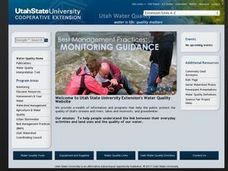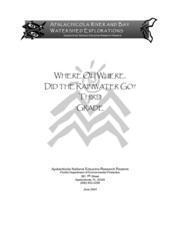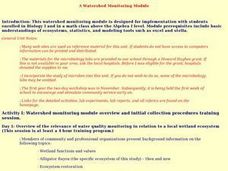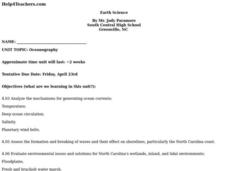Curated OER
Stream
Students examine stream waters. In this scientific inquiry lesson, students "explore" wetlands as they participate in a demonstration that reveals information about steam waters and insects.
Curated OER
All Hands on Deck: A Harbor Education Program
Young scholars build a model of an estuary. In this wetland lesson, students build a model estuary with a paint tray and modeling clay. They use the model to illustrate the impact of non-point pollution on the watershed.
Curated OER
Our Keystone FFA Spring
Students identify where their water sources and explore a watershed on a map. In this watershed lesson students walk a wetland, and identify sources of pollution.
Curated OER
Lake Log: Diary of the Basin
Students log news articles about the changes in the Lake Pontchartrain Basin. In this wetlands and news lesson, students track articles about the wetlands area around Lake Pontchartrain, write brief summaries, include pictures, and put...
Curated OER
What's a Swamp Good For?
Students identify the function and value of wetlands. In this lesson on appreciating wetlands, students explain how different household items can represent different aspects of the wetlands.
Curated OER
How Our Water Becomes Polluted
Students list causes of water pollution, discuss how people contribute to water pollution, and explain concept of watershed.
Curated OER
Surface Water Model
Students examine, through demonstration and experimentation, how water moves through watershed, identify pollutants that can enter water system from different land use activities, and discuss ways people can help prevent water pollution.
Curated OER
User-friendly rivers
Learners explore and explain their connection to rivers through watersheds. They break into three groups. Each group needs: Blue enamel paint, Miniature objects to simulate a model river system, modeling clay, Tempera paint, Toothpicks...
Curated OER
Environment: The River Classroom
Seventh graders engage in hands-on experiments and activities dealing with rivers and greenways. They also observe lectures and demonstrations by experts in water and river restoration. Students and teachers participate in canoe trips...
Curated OER
Boston Harbor Cruise: A Shoreline Survey
The students take a harbor cruise, photograph, and draw shore line features attending to evidence of human impact/consequences, and its cost on marine/land animal habitats vegetation, weather patterns, signs of erosion, and the water...
Curated OER
Where Oh Where Did the Rainwater Go?
Third graders conduct an experiment to determine how water moves through different soils found in the Apalachicola River watershed. They read a scenario, conduct the experiment, answer follow-up questions, and draw the water movement...
Curated OER
Junior Engineering Surface Water
Students experience the effects of pollution and erosion on a model of a watershed and explore ways to change the outcome.
Curated OER
Water Pollution Graphing Activity
Students describe and identify the link between land use activities within a watershed and water quality. They evaluate the quality of a "water sample" ( a bag of skittles), graph their results, and form a hypothesis about the land use...
Curated OER
What is an Estuary?
Students define the terms estuary and watershed. They conduct an experiment to determine the density differences between fresh and saltwater. They examine the salinity distribution of the Peconic Bay Estuary.
Curated OER
Backwards Goes It Does
Students create a three-dimensional model of the Chicago river watershed to determine the flow of the river at its mouth. They use prepared clear gelatin and topographic maps to discover that the building of canals actually reversed the...
Curated OER
A Watershed Monitoring Module
Students explore the relevance of water quality monitoring in relation to a local wetland ecosystem. They conduct standard water quality tests using wet tests and CBL calculators and probes. Student record and interpret the results.
Curated OER
Storage, Use, Pollution,& Clean Up of Water
Students synthesize water resource educational posters into class presentations based on the poster's theme. Working in groups, they make presentations on wastewater, water uses, watersheds, groundwater, wetlands,water quality, and...
Curated OER
Earth Science
Students analyze the mechanisms for generating ocean currents, temperature, and deep ocean circulation. They are able to assess the formation and breaking of waves and their effect on shorelines, particularly the North Carolina coast. ...
Curated OER
Aquatic Communities
Students watch a video about aquatic communities. They conduct an experiment that shows how movement of rivers change the landscape. They compare fresh and salt water communities and its wildlife.
Curated OER
The Effect of Tides & Elevation on Wetland Plant Communities
Students comprehend how tides can impact shoreline plant communities through the study of a freshwater tidal marsh. They use actual tidal data to show that tidal ranges differ among geographic locations, even those relatively close...
Curated OER
Marvelous Marshes of the Chesapeake
Third graders identify sources of salt water and fresh water that enter the Chesapeake Bay. They build a model watershed and describe how runoff enters the Bay.
Curated OER
Is Urban Sprawl Causing Us To Lose More Than Ground?
Pupils map the changes that occur in the land as a result of urban sprawl. They explore the problems that paving and building have on the watershed and the habitats on the Northshore.
Curated OER
Turning the Tide on Trash: Marine Debris Curriculum
Seven pages of fascinating reading on marine debris preface the activities in this lesson plan. Four different activities are employed to simulate how the debris is distributed in the ocean and along beaches. Early ecology learners...
NOAA
Marine Ecosystems
Be at the top of the food chain when it comes to understanding marine ecosystems. The 21st installment of a 23-part NOAA Enrichment in Marine sciences and Oceanography (NEMO) program investigates marine ecosystems, ocean zones, and food...








